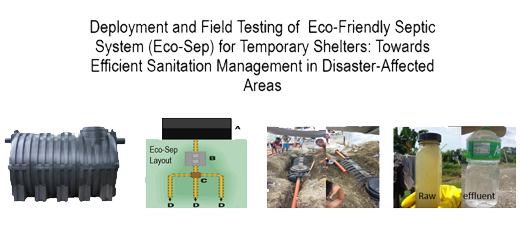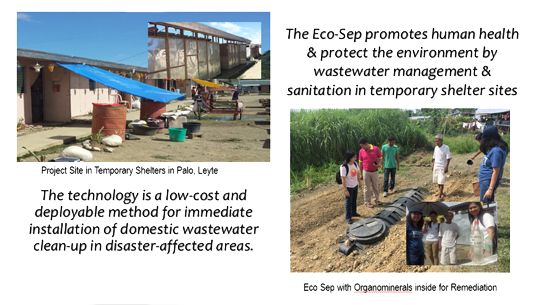A newly-developed portable eco-friendly septic system enhanced with organominerals meant for disaster areas is also applicable in condominiums and other housing projects.
Following the many big disasters that happened in the country, the DOST resolved to look at rehabilitation measures and programs on a macro scale, taking into consideration all scenarios and looking at possible S&T interventions for rehabilitation. The immediate need for relief or emergency food has been addressed and the DSWD has started to order in bulk DOST-developed emergency foods for future eventualities. Another immediate problem is wastewater and sanitation in communities where households are displaced from their private homes. For this, the DOST saw the need for an efficient sanitation management to address the vulnerability and risks caused by sanitation problems particularly in temporary shelters.

The Adamson University (AdU) has developed an Eco-Friendly Septic System (Eco-Sep) that is a self-sustaining and portable/movable wastewater treatment system that uses an innovative combination of bio-stimulation and filtration. According to Project Leader Dr. Merlinda Palencia of AdU's Chemical Engineering Department, it is a low-cost and deployable method for immediate installation of domestic wastewater clean-up in disaster-affected areas anywhere in the country. Being enhanced with organominerals makes the Eco-Sep appropriate in a disaster stricken areas.

The project deployed and field-tested three Eco-Sep Systems for 522 residents in temporary shelters in Palo, Leyte with 61 latrines and 30 bathing cubicles. Remediation using organominerals were conducted using varying concentrations of organominerals to determine the optimum retention time and treatment dosage based on coliform count, BOD, VOC and COD reduction, and increase in DO level. Results of the 14-day field testing resulted to a significant reduction
The use of the Eco-Sep system significantly reduced the parameters after the 14-day remediation using the organomineral.
During the presentation of the project results last February 16, 2015 at the PCIEERD Conference Room, Mayor Remedios Petilla of Palo Leyte said that the Eco-Sep technology results to a cleaner environment to the residents temporarily staying at the bunker houses. She recommended that the Eco-Sep be incorporated in the engineering design for the rehabilitation projects in Leyte.
With this positive result, the project will develop the installation, operation and maintenance protocol of the Eco-Sep System for immediate deployment in temporary shelters and mass evacuation sites that will enable residents to install and maintain the system themselves.
Such S&T intervention will indeed make every Juan's life better but another good result is the application of the Eco-Sep System not only in temporary shelters but also in condominiums and domestic housing. (Maria Elena A. Talingdan, DOST-PCIEERD)




